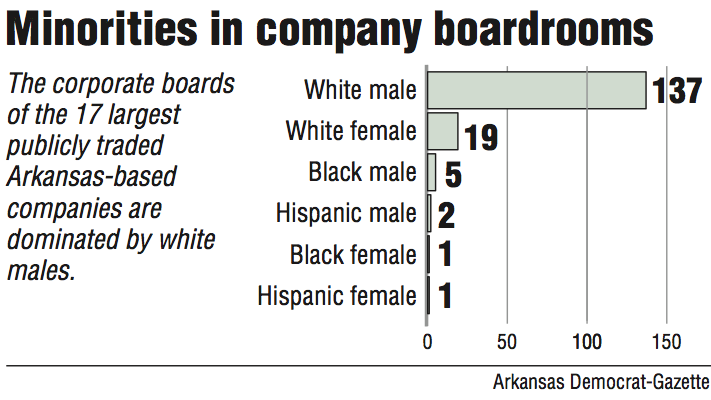The corporate boardrooms of Arkansas' largest public companies are less diverse than the national average, according to an analysis by the Arkansas Democrat-Gazette and reports by executive consultants and recruiters.
Of the 166 directors of the state's 17 largest public companies, 21, or 12.7 percent, are women.
Nationally, women account for just under 18 percent of the boards of the companies that make up the Standard & Poor's 500 index, a slight increase from 17 percent in 2012, according to consultant firm Spencer Stuart's U.S. Board Index 2013.
The corporate boards of S&P 500 companies have seen an increase -- from 12 percent in 2012 to 18 percent in 2013 -- in the number of black, Hispanic and Asian directors, according to the Spencer Stuart report.
While executive consultants and recruiters say diversity on corporate boards can be healthy for companies, bringing a variety of viewpoints that influence company decisions, 83 percent of the 166 board seats in Arkansas are filled by white males. The board members of four companies -- USA Truck, America's Car-Mart, PAM Transportation and Deltic Timber -- are all white males.
"Everyone has been male and white," said Jeff Williams, chief financial officer and board member at America's Car-Mart. "We certainly are aware of those issues and would welcome any qualified candidates to the board."
He said the company wants to include women and minorities on its board of directors when spots become available.
Board diversity can reduce the number of risky decisions directors make, said Ya-Wen Yang, assistant professor of accounting at Wake Forest University. She is one of the authors of a study under review that examines diversity and corporate risk taking.
"When you go to a group setting, you think there's other people to share the blame," she said. "We found that when the board is diverse, it's actually more risk adverse."
Yang said female board members were found to particularly dislike big risk taking.
"If my company's been taking too much risk and I want to tone it down as a shareholder the best thing to do is to have a diverse board," she said.
Josh Henke, executive director at Longnecker and Associates, an executive-compensation consulting firm in Houston, said growing companies will look for board members who bring new perspectives.
Many Arkansas boards tend to be stocked with relatives, Henke said. The intent in many cases is "to keep family history and original intent or mission intact," he said.
The number of women on boards of directors remains low, Henke said.
"As we see more [women] getting into executive ranks, we'll see more getting into board positions," he said, adding that women executives often bring expertise in human resources and compensation.
Ron Parker, president and chief executive officer of the Executive Leadership Council, a group for black business leaders, said black executives have also been making modest gains in board representation in recent years.
He said the Leadership Council wants to place 200 black men and women on the boards of publicly traded companies in the next 5-7 years.
"Shareholders want more diversity and transparency," Parker said. "This is an opportunity for organizations to grow."
Like America's Car-Mart, other corporate boards wish to diversify, said David Kopsch, president of the Northwest Arkansas chapter of the Association of Latino Professionals For America.
"One of the things that Wal-Mart and other companies are doing is that they're all training and developing the next generation," he said.
Kopsch said his group regularly works with companies such as Wal-Mart, Tyson and J.B. Hunt, all of which are seeking to diversify their payrolls at every level.
"They're looking to make their workforce more diverse like their consumers," he said.
The boards for Wal-Mart and Tyson Foods are more diverse than the Arkansas average. And Kopsch called J.B. Hunt a leader in the trucking industry in the hiring of minorities.
Despite efforts to add a variety of voices to their boards, there's still a demographic gap, according to advocacy groups.
The addition of Hispanic men and women to corporate boards has been stagnant in recent years, said Cid Wilson, president and chief executive officer of the Hispanic Association on Corporate Responsibility.
In 2013, Hispanics held about 3 percent of Fortune 500 board seats nationwide. Three corporate board seats in Arkansas are filled by Hispanics who sit on the boards of Tyson Foods, Inc., Wal-Mart Stores and Home BancShares.
"Having Latinos serve on corporate boards ... is going to give that company a particular edge when it comes to marketing and selling products to the community," Wilson said.
He said his group is particularly focused on promoting Hispanic leadership in the coming years. He said Hispanic women are often responsible for making purchasing decisions in their households, yet few corporate board members can relate to their backgrounds and unique experiences. Hispanics hold less than 1 percent of Fortune 500 board seats.
Parker, with the Leadership Council, said there is a similar lack of representation for black female leaders.
Bank of the Ozarks is the only board in the state with a black female director.
"Any organization that's looking for growth needs to have diverse perspectives to consider," Parker said.
Wilson said diverse corporate boards can help consumers feel more in touch with companies.
"You want to feel with the product you're buying that the people behind those products understand your community," he said.
SundayMonday Business on 09/07/2014
